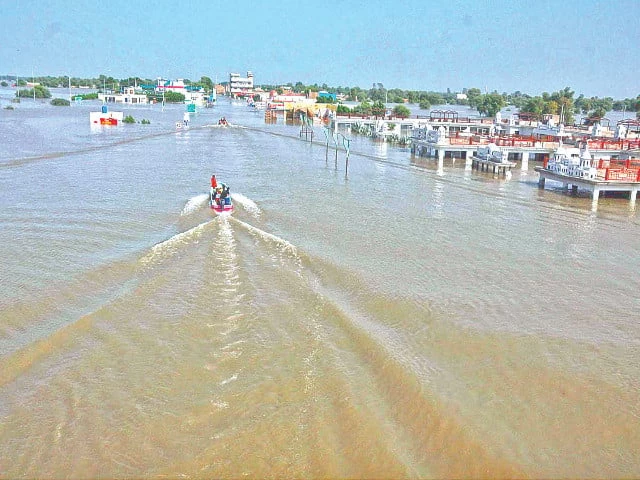Islamabad:
The International Monetary Fund (IMF) does not provide any major setbacks for economic growth or the collection of income from Pakistan this exercise due to recent floods. With the exception of Punjab, the provinces have also not pointed out significant economic losses, minimizing the chances of a drop -down revision of targets.
According to government sources, the Pakistani authorities have evaluated the losses related to floods in three rivers, but the assessment of infrastructure destroyed or damaged in Punjab is still underway.
Government sources have declared that a delegation of the IMF shared its point of view on the economic impacts of the floods at a kick -off meeting with the Minister of Finance Muhammad Aurangzeb. The governments of Balutchistan, Sindh and Khyber-Pakhtunkhwa (KP) shared their initial flood losses with the IMF team during separate meetings.
The sources said that during the launch meeting, the IMF team observed that on the basis of initial contributions, there were no significant economic losses. However, the IMF said that he would wait for the damage assessment report, added the sources.
The world lender has also seen no impact on floods on tax revenue. He stressed that the Federal Board of Return (FBR) should share the visible result of the transformation plan. Prime Minister Shehbaz Sharif approved the transformation plan last year to revitalize tax machines and also gave more than 55 billion rupees for various initiatives within the framework of the plan.
IMF observations on the impact of floods occurred at the heel of the Prime Minister’s request to the Director General of the IMF to take into account the impacts of the floods during revision meetings. The IMF has been informed that the government could respond to expenses related to the emergency basin floods and that it may not need additional resources, sources said.
Discussions on the Revue du Pakistan-IMF began on September 25, which should continue until October 8. The successful culmination of these talks would open the way to the publication of two tranches, totaling more than $ 1.2 billion in two different loan programs.
In addition, the sources said that the internal evaluation of Pakistan was that there would be no major impact on the floods on economic growth. The government set a growth target of 4.2% and it still plans to go from 3.7% to 4%, the sources added.
Total economic losses are estimated by the planning commission at around 360 billion rupees, or 0.3% of the economy size. The assessment of the commission was that GDP growth could still remain around 4%.
One of the reasons for not estimating major losses against crops was that sowing rice and sugar cane took place more than the initially estimated area. This would compensate for the impact of culture loss, they added.
The current account deficit would not increase either beyond the estimated figure, because no additional need for imports is projected due to the floods, the sources added. Pakistani authorities also do not see a major increase in imports. However, the IMF has not yet shared its projection of economic growth, imports and current account deficit.
The sources have indicated that the IMF delegation had raised the question of the delay in the publication of the evaluation report for the diagnosis of governance and corruption. The authorities assured the world lender that the government would publish the report during this week.
The report underlines many shortcomings in the judicial, administrative and business structure of Pakistan, which has contributed to bad governance in each important sphere of life. The IMF also submitted a dozen recommendations to guarantee the rule of law and the integrity of the judiciary.
During its meetings with three provinces, the IMF highlighted the low health and education expenses during the last financial year. The KP government said low health expenses were due to the fact that many doctors could not be filled due to the slow hiring process.
The IMF has asked if the provinces could respond to additional expenses for the rehabilitation linked to floods. The sources said that provincial governments did not indicate the need for additional resources due to a limited impact.
However, the position of the Punjab government will be important in this regard, which plans to provide a complete rehabilitation set to affected people. The province is the most affected by the floods and its meeting with the IMF will take place this week.
The governments of KP and Sindh shared their initial assessments. According to the authorities, the Sindh estimated that economic losses could remain in the order of 40 billion rupees at 50 billion rupees. The KP government has told the IMF that losses could be around 30 billion rupees.
The FBR remains the weakest link in the chain. Tax authorities find it difficult to achieve the objective of RS3,083 Billions of RS. They needed more than 500 billion rupees on September 30 (today) – the end of the first quarter of the current financial year – to reach the objective.
The filing of the income tax declaration also amounts to approximately 3.2 million against the total of 7.7 million declarations filed for the 2024 taxation year. The FBR has also extended the date of import rights and two -month tax sugar for November. Earlier, he informed that sugar can be imported into a tax franchise until September 30.
The FBR has also granted an additional two -month extension to traders in the real -time electronic transmission of the receipts for sales tax for FBR computers. It was the second extension, which is equivalent to accepting the impassability of previous deadlines.




